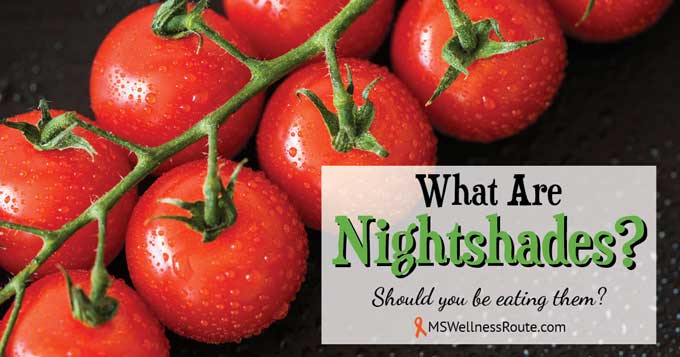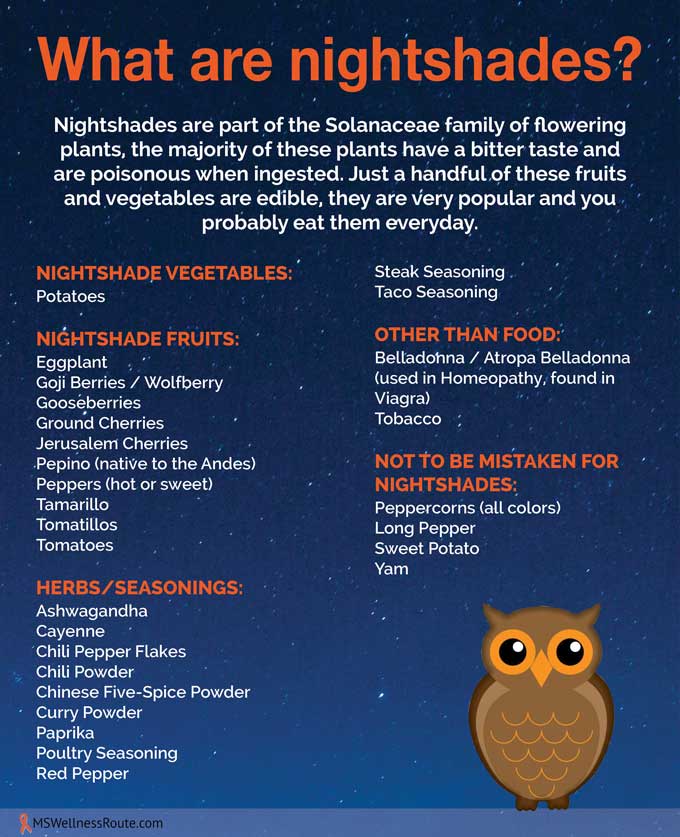Last Updated on April 1, 2025 by Cathy

Nightshades are part of the Solanaceae family of flowering plants, the majority of these plants have a bitter taste and are poisonous when ingested with just a handful that is edible.
A few of the edible nightshades include tomatoes, eggplant, and peppers both sweet and hot. These nightshades are actually considered fruit because they develop from a flower and they contain seeds. The potato is the only actual vegetable in the nightshade family, it’s a vegetable because it develops from either the stems, leaves, roots, or flower buds.
- Eggplant
- Goji Berries
- Peppers (sweet or hot)
- Potatoes (sweet potatoes are okay)
- Tomatoes
- Tobacco
All potatoes are nightshades, green potatoes and potatoes that have started to sprout should be avoided because they are toxic. To make it confusing, sweet potatoes are not part of the nightshade family, they are part of the Convolvulaceae family of plants.
This also includes any spices from the nightshade family like paprika or cayenne pepper. This gets a little more confusing because you would think it included black pepper (because of the name), but black pepper comes from peppercorns so it’s not considered nightshade.
All nightshades contain small amounts of nicotine. The health effect of the small amount of nicotine in these foods is unknown but some researchers wonder if this is why some people feel addicted to them.
What’s Wrong with Nightshades?
Nightshades have a chemical compound called glycoalkaloids, it works by defending itself from fungi diseases, and predators making itself poisonous. It’s a natural pesticide to intruders which in turn helps protect the plant.
Glycoalkaloids are not only poisonous to other insects but they are also poisonous to people, potatoes are the most toxic in the “edible” nightshade family. There are many reports of people getting “food poisoning” from eating raw, green, or sprouting potatoes. High doses of glycoalkaloid can cause serious symptoms like low blood pressure, confusion, neurological problems, and even death.

What are glycoalkaloids?
Glycoalkaloid destroys cell membranes, research has shown that they can break open the membranes of red blood cells and mitochondria. A study from the Oregon Health & Science University in Portland discovered that DNA defects of the mitochondria could be a possible cause of MS, contributing to the loss of myelin.
Glycoalkaloids are anti-inflammatory, they kill bacteria and viruses, and have anti-cancer properties. The problem with glycoalkaloids is they kill both the bad cells and the healthy cells. Some scientists have wondered whether glycoalkaloids could be a potential cause of the leaky gut.
Potato leaves, stems, and shoots are naturally high in glycoalkaloids. They are 3 to 10 times greater in the peel than in the flesh. Glycoalkaloids are being used as a stimulant or for medical purposes and can be found in caffeine, chocolate, codeine, morphine, and nicotine.
The edible nightshades have small traces of alkaloids so most people can eat these without any problems. People whose digestive system is compromised and those with autoimmune diseases like multiple sclerosis can be sensitive to nightshades without even knowing it.
Sensitivities
For people with autoimmune diseases, their intestinal tract begins to break down while creating holes for food and toxins to enter into the bloodstream, the body begins to see these as foreign invaders and begins to attack itself (hence the name – autoimmune).
Most people with sensitivities to nightshades don’t even realize it, symptoms can be bloating, depression, flatulence, gallbladder problems, abdominal pain, headaches, fatigue, joint pain, morning stiffness, muscle pain, and nausea. It’s very easy for someone to think the symptoms are being caused by something entirely different.
I recently discovered this for myself, it wasn’t until I removed tomatoes from my diet and then reintroduced them that I discovered my body was reacting to them. I did this three different times (Because I just couldn’t believe it!) and all three times my face broke out after I ate the tomato.
Possible connections to diseases
Researchers have not officially studied the connection of nightshades to chronic pain, arthritis or autoimmune diseases. It’s only based on personal experiences, nutritionists, and functional medicine specialists who have noticed the connection.
- Chronic Pain Syndromes
- Eczema
- Fibromyalgia
- IBS
- Lupus
- Rheumatoid Arthritis
Should you avoid nightshades?
Possibly. If you are trying to heal from an autoimmune disease, especially rheumatoid arthritis, it would be worth the time to find out if they could be potential culprits to your gastrointestinal, joint pain, neurologic, or psychiatric symptoms.
It would be a good idea to try an elimination diet for 30 days, NO CHEATING! Reintroduce them one at a time and wait a few days before reintroducing the next (symptoms can take a few days to show up, so be patient) to see if you have any sensitivities to them.
This is how I discovered I’m sensitive to tomatoes and chipotle, before that I had no idea. After eliminating the nightshades for one month and reintroducing them then you discover your body has no sensitivities to them, go right ahead and continue to enjoy eating them!
Nightshades Food List
Get the password to my library with MANY wellness printables including Nightshades Food List here by filling out this form:
Resources:
http://www.sciencedirect.com/science/article/pii/S092544390900146X





